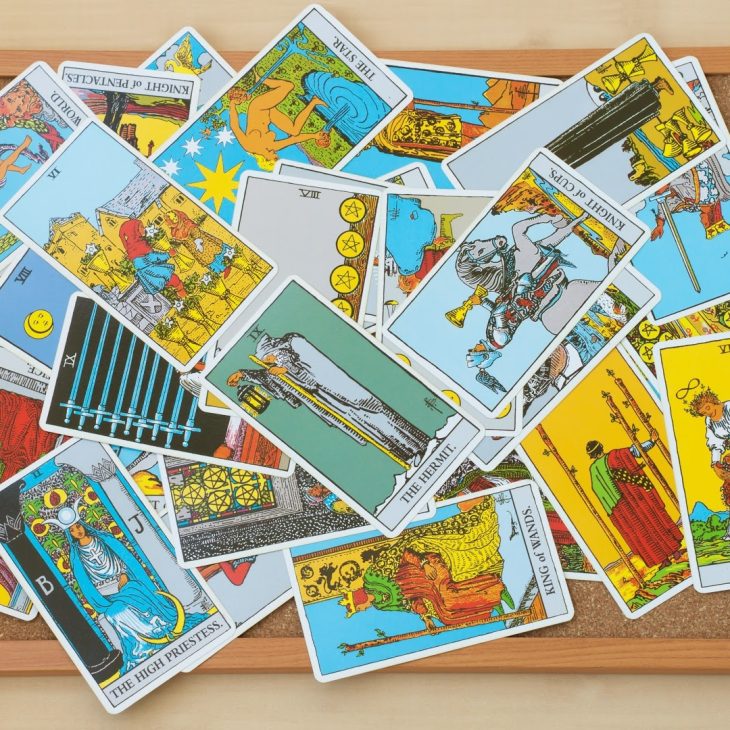Tarot, A Faith that Has Room For You
November 10, 2020

I discovered tarot during a road trip in California with a bunch of very queer, mostly femmes of color.
The deck was the Wild Unknown by Kim Krans. It too was very witchy and also very queer, with various depictions of animals set against wildlife backdrops, several of which were splashed with rainbow accents.
It was very unlike the image of tarot the media had imprinted in my mind. There wasn’t an elderly woman wearing esoteric beads. No dark tapestries or crystal balls. No devils or demons, just a set of pretty card stock and a description booklet. The inside of which said, “you’ll find no wrongs or rights, only mirrors.” An apt invocation, for as we rode through the desert asking questions about our love lives, our writing, and our futures, the answers received weren’t fatalistic, but rather invited more reflection.
“You gotta be careful,” my friend said from the front seat, “you’ll mess around and end up asking what you should have for dinner.”
That small moment spearheaded my journey with tarot, a road that, once I decided to take it seriously, has unearthed eerily uncanny results.
The psychic services industry, which includes tarot of course, but also pertains to palmistry, numerology, and astrology–is estimated to be a $2 Billion dollar industry. This number is surprising, not because it shows a lack of faith in traditional religion–which is often fraught for many Black and Brown folks, especially those of us who are queer. But because it hints at the reality that people aren’t necessarily rejecting faith, but rather aspire to a faith that gives them room to be the fullness of who they are.
Growing up as Black and gay man, religion for me was always a matter of “wrongs” and “rights.” In 6th grade, when I realized that my fascination with making sure that I got to the bus stop in time to ride with one of my male classmates was more than just a matter of friendship, the first thing I knew was that I was going to “hell”. My family wasn’t even religious, but somehow, at 12 years old, I knew that liking boys meant that I was sentenced to eternal damnation.
Being the perfectionist student that I was, I recall researching hell, and learning that it’s only loosely mentioned in the Bible as a “lake of fire,” and I spent several unquantifiable moments sitting on my undersized bean bag chair trying to imagine what it would feel like to burn for eternity. I told myself that in order to repent I had to read a chapter of the Bible every night. If I slipped up and masturbated to gay porn, I read two.
I had droned halfway through the Book of Numbers before I decided to switch to the New Testament, which I figured was probably more interesting because it at least included Jesus.
In retrospect, that switch to the New Testament forecasted the role tarot plays in my life now. Though a bleak beginning, I was discovering that spirituality was something I would have to co-create with God for myself. Being gay, I was wrong, but I still existed. So somehow I needed to reconcile my existence against the lived reality that was telling me that I didn’t.
Because it is a “mirror,” rather than a series of rules and constrictions, Tarot has been a tool whereby I can validate the truth of my presence in a world that obscures it. And as much as I love astrology, you don’t need specialized knowledge or a grand belief in the arrangement of the stars to access it. Make no mistake, while Tarot holds deep reserves of esoteric imagery with a long history, as well as being a great activation tool for your own intuitive gifts, it is still deeply intimate and personal. All you need is a moment and a deck, and if you’re fancy, perhaps a journal. And in that moment, you get the opportunity to bear witness to yourself.
As rising rates of reported loneliness and depression rage across the Western World like the California wildfires, we need to find ways to be witnesses to ourselves. In a world where Black and Brown people’s peoples experiences are often gaslighted and minimized, holding space for ourselves and each other becomes even more important.
Over the next months I will be writing in this space to dispel a lot of the myths surrounding tarot, while also offering tarot-inspired glimpses into how it has manifested in my life, readings for others, and the role it can play in helping people to hold space for their own reality. At its simplest, Western Tarot is a series of 78 cards, with traceable roots to a 15th century Italian game known as Tarocchi, and at its most complex, it is a conversation with spirit.
For those of us who have had no choice but to create our own spiritual safety nets, Tarot is another thread to keep us suspended.
Aaron Talley is a writer, activist, and educator who teaches middle school on Chicago’s South Side and a 2020 Interfaith America Racial Equity Fellow.
Share
Related Articles
American Civic Life
Racial Equity
Can Tarot Predict the Future? What We Can Learn From Black Divination
American Civic Life
Gen Z is Keeping the Faith. Just Don’t Expect to See Them at Worship.



